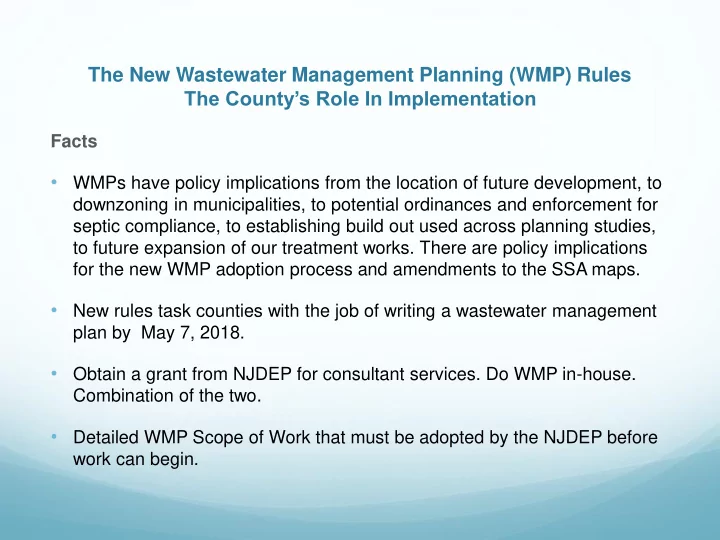

The New Wastewater Management Planning (WMP) Rules The County’s Role In Implementation Facts • WMPs have policy implications from the location of future development, to downzoning in municipalities, to potential ordinances and enforcement for septic compliance, to establishing build out used across planning studies, to future expansion of our treatment works. There are policy implications for the new WMP adoption process and amendments to the SSA maps. • New rules task counties with the job of writing a wastewater management plan by May 7, 2018. • Obtain a grant from NJDEP for consultant services. Do WMP in-house. Combination of the two. • Detailed WMP Scope of Work that must be adopted by the NJDEP before work can begin.
The New Wastewater Management Planning (WMP) Rules The County’s Role In Implementation Questions Each county assigned a NJDEP staff person. There should be a high-level of coordination between county planners and NJDEP staff. New Plan must include a wastewater capacity analysis; a nitrate dilution analysis; a build out analysis; a preliminary septic management plan; extensive mapping. How are counties to develop arguments on any towns that they believe are urban but that have been excluded by the new definition without guidance being provided by the NJDEP? Downzoning will likely need to occur in many of our municipalities to meet nitrate dilution standard, how is this policy to be implemented and by whom? Counties have committed themselves to developing a septic plan overtime without knowing exactly what will be required in the end to ensure that residents and others maintain and replace their systems. Ordinances and enforcement?
The New Wastewater Management Planning (WMP) Rules The County’s Role In Implementation County Role The County GIS Departments will create maps that represent a tremendous amount of information for the plan. While we are working on our WMPs, we are responsible for reviewing amendments and revisions to the sewer service area (SSA) map. Designated planning agencies have authority over area-wide WQM plans that go beyond WMPs. Seven counties became “designated planning agencies” with expanded planning authority in one of 12 WQM areas that together cover the entire state of New Jersey. The remaining 14 counties are designated as “wastewater planning agencies” in the new rules.
The New Wastewater Management Planning (WMP) Rules The County’s Role In Implementation Insights The success of our plan will rely on a partnership between NJDEP and the Counties. It is critical that when the counties finally supply the complete version of the WMP to the NJDEP that it will have been vetted sufficiently that it can be speedily adopted by NJDEP. Adoption of sections of the plan should occur in a timely manner by the NJDEP, so that counties can meet the demands of producing this important policy and planning document. Counties are hoping for a sharing of power during final adoption of the WMP to ensure consensus on the ground. No public hearings are required for amendments pursuant to the new rule. An approach that ensures that the voices of municipalities and counties is heard is critical to the integrity of the amendment process.
The New Wastewater Management Planning (WMP) Rules The County’s Role In Implementation Pros No more moratorium on sewer connections if a county or municipality does not have an adopted WMP by the deadline. Greater flexibility, in theory, in the implementation of strategies to meet the nitrate dilution standard. Greater support from NJDEP staff. Amendment and revisions reviewed electronically, saving counties resources.
The New Wastewater Management Planning (WMP) Rules The County’s Role In Implementation Observations The new rules do not require that counties comment on revisions and amendments applications by developers to the county sewer service area maps. The applicant makes a request to the county and the affected municipality for a statement of consent resolution which should state if the proposed project is consistent with the county master plan. These comments should be required by the NJDEP, and the NJDEP should in turn document in writing how the consent letter impacted the NJDEP to approve or deny the development application in question.
The New Wastewater Management Planning (WMP) Rules The County’s Role In Implementation Conclusions The intent of the new rules maximize efficiency. If a county does not have an adopted WMP, they must still process amendment and revision applications for new development to provide assurance to the development community that projects can move forward. The old rules linked an adopted WMP to amendments moving forward. This uncoupling of WMP from amendment process must not create a situation where WMPs languish due to lack of NJDEP staff time and resources. The challenge on both sides is making sure that we, the counties and the NJDEP, have adoptable plans in place by May 7, 2018.
Recommend
More recommend